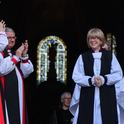When we arrived in Orkney the coast was alive with seabirds. But with the approach of winter, our cliffs fell silent. I couldn’t help but mourn the disappearance of the puffins and the razorbills and all the rest; the coast seemed bereft.
For a few days, I felt a flicker of doubt. This far-northern landscape, with its long smooth arcs of land, uncluttered by trees, felt strange to me. And so, in a different way, did my new village—as I introduced myself over and over, tried to match names to faces, fell out of old routines and into new ones. It can be difficult to start afresh somewhere new. We came with the right attitude, and the right kind of energy. But it’s hard to let go of the familiar.
A few weeks ago, just as the weather was closing in on us, the birds returned. Different birds, this time: pink-footed geese dropped in on their way south from Greenland—great straggling skeins of them, weaving and interweaving, plaiting together and apart, backlit in a watercolour sky. They’ll overwinter here in the UK, as they do every year.
When I went riding with some new friends we stumbled into one of their gathering places in a sheltered valley, and the thundering approach of the horses sent the geese into the air, a parting of the waves as two sheets of gabbling, cacophonous life rose up on either side. They took to the air, wheeled in a single sweeping turn, then wobbled back down into the fields to graze.
Then last week, a happy surprise. As I bustled home from the stables, I found the path blocked by a huddle of women wearing binoculars. When I followed their gaze I found a dozen waxwings—beautiful, rosy-chested birds with vogueish quiffs and dramatic black make-up—cider-drunk and feasting on fallen apples. The birds were over from Norway and in search of the haws, hips and rowan berries that hang ripe in the trees like lanterns.
The waters around our archipelago too have seen a seasonal shift in population. As summer drew to a close the basking sharks—those gentle, dim-witted sea monsters—left the shallows for the open water. But in their place came a super-pod of porpoises, while November marked the arrival of two pods of orcas, on a hunting trip for seals, whose pups are just now creeping down the beaches and making their first forays into the waves.
As the wheel of seasons turns, with it comes these great movements of animals and birds. It has been reassuring to look up, or out to sea, and see our fellow creatures making far greater journeys than ours. And to see, too, that to move is only natural.
We are still making ourselves at home, getting to know the lie of the land. But our new village has been so warm and welcoming. It’s been easy to meet people, in the way it often isn’t in the city: neighbours knock on the door, lend us a ladder, invite us for a drink. And then there are those unexpected new joys that surprise you in a new place. The otter that dashed across the road one morning as I drove, bleary-eyed, for the ferry. Or these extravagant, feverish sunsets that unfurl across the skies from the west, gilding those smooth, unadorned uplands, sending sparks shooting out between the clouds.
We have lost things by leaving, but gained new ones in the arriving. This morning, rounding the headland on a coastal path, I found three seals hauled up on the rocks, basking in the winter sun, and felt my heart fill with a new sort of sense of belonging. What a beautiful place. And it can be my place, at least for now.

Illustration: Kate Hazell
We moved to a remote island—when will it feel like home?
We came with the right attitude, and the right kind of energy. But it’s hard to let go of the familiar
December 9, 2019











